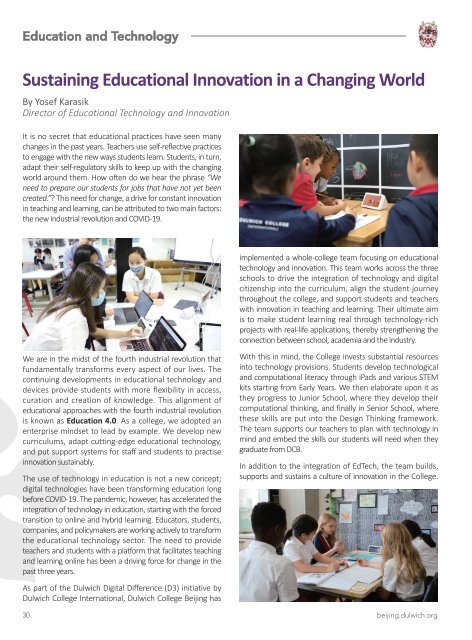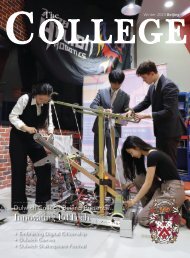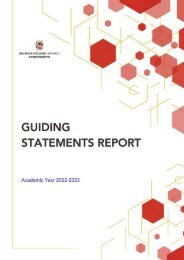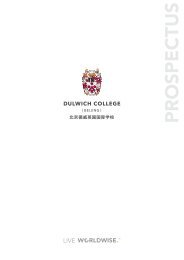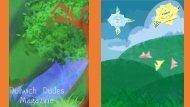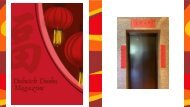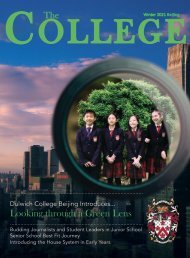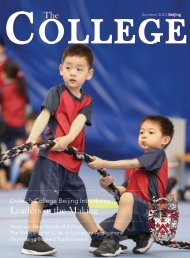The College Magazine Summer 2022
We have the pleasure to announce that our Summer 2022 edition of The College Magazine is now available! Some of the students from DCB Senior School Global Goals Club will take you through a student-led journey to global citizenship and share some of the projects they successfully launched in the past school year. Student leadership is a broad concept that encourages every student to take ownership and responsibilities. You will read about programmes and activities that are provided in DCB Early Years to foster student agency from a younger age. Junior School Student Council share their creative initiatives, including 'No Carbon November'. The Dulwich Dudes Podcast and Magazine team from Junior School reflect their first year of journalism activities. Check out their thoughts and ideas! Some of the 2022 graduates share insights that they have gained through the university application journey.
We have the pleasure to announce that our Summer 2022 edition of The College Magazine is now available!
Some of the students from DCB Senior School Global Goals Club will take you through a student-led journey to global citizenship and share some of the projects they successfully launched in the past school year.
Student leadership is a broad concept that encourages every student to take ownership and responsibilities. You will read about programmes and activities that are provided in DCB Early Years to foster student agency from a younger age.
Junior School Student Council share their creative initiatives, including 'No Carbon November'. The Dulwich Dudes Podcast and Magazine team from Junior School reflect their first year of journalism activities. Check out their thoughts and ideas!
Some of the 2022 graduates share insights that they have gained through the university application journey.
Create successful ePaper yourself
Turn your PDF publications into a flip-book with our unique Google optimized e-Paper software.
Education and Technology<br />
Education and Technology<br />
Sustaining Educational Innovation in a Changing World<br />
By Yosef Karasik<br />
Director of Educational Technology and Innovation<br />
It is no secret that educational practices have seen many<br />
changes in the past years. Teachers use self-reflective practices<br />
to engage with the new ways students learn. Students, in turn,<br />
adapt their self-regulatory skills to keep up with the changing<br />
world around them. How often do we hear the phrase “We<br />
need to prepare our students for jobs that have not yet been<br />
created.”? This need for change, a drive for constant innovation<br />
in teaching and learning, can be attributed to two main factors:<br />
the new industrial revolution and COVID-19.<br />
We are in the midst of the fourth industrial revolution that<br />
fundamentally transforms every aspect of our lives. <strong>The</strong><br />
continuing developments in educational technology and<br />
devices provide students with more flexibility in access,<br />
curation and creation of knowledge. This alignment of<br />
educational approaches with the fourth industrial revolution<br />
is known as Education 4.0. As a college, we adopted an<br />
enterprise mindset to lead by example. We develop new<br />
curriculums, adapt cutting-edge educational technology,<br />
and put support systems for staff and students to practise<br />
innovation sustainably.<br />
<strong>The</strong> use of technology in education is not a new concept;<br />
digital technologies have been transforming education long<br />
before COVID-19. <strong>The</strong> pandemic, however, has accelerated the<br />
integration of technology in education, starting with the forced<br />
transition to online and hybrid learning. Educators, students,<br />
companies, and policymakers are working actively to transform<br />
the educational technology sector. <strong>The</strong> need to provide<br />
teachers and students with a platform that facilitates teaching<br />
and learning online has been a driving force for change in the<br />
past three years.<br />
As part of the Dulwich Digital Difference (D3) initiative by<br />
Dulwich <strong>College</strong> International, Dulwich <strong>College</strong> Beijing has<br />
implemented a whole-college team focusing on educational<br />
technology and innovation. This team works across the three<br />
schools to drive the integration of technology and digital<br />
citizenship into the curriculum, align the student journey<br />
throughout the college, and support students and teachers<br />
with innovation in teaching and learning. <strong>The</strong>ir ultimate aim<br />
is to make student learning real through technology-rich<br />
projects with real-life applications, thereby strengthening the<br />
connection between school, academia and the industry.<br />
With this in mind, the <strong>College</strong> invests substantial resources<br />
into technology provisions. Students develop technological<br />
and computational literacy through iPads and various STEM<br />
kits starting from Early Years. We then elaborate upon it as<br />
they progress to Junior School, where they develop their<br />
computational thinking, and finally in Senior School, where<br />
these skills are put into the Design Thinking framework.<br />
<strong>The</strong> team supports our teachers to plan with technology in<br />
mind and embed the skills our students will need when they<br />
graduate from DCB.<br />
In addition to the integration of EdTech, the team builds,<br />
supports and sustains a culture of innovation in the <strong>College</strong>.<br />
Pioneering Spirit is one of our pillars. As a leading<br />
international school, we want to ensure that innovation<br />
is put into practice and embedded in our curriculum.<br />
Since the team was formed, we have been developing<br />
relationships to collaborate on exciting, innovative ideas.<br />
One of our focuses is enriching our curriculum with<br />
Artificial Intelligence (AI).<br />
<strong>The</strong> introduction of AI is a two-fold project. On the one hand,<br />
we want to expose our students to AI, and develop their AI<br />
literacy from a young age, along with their understanding<br />
of complex concepts. This is achieved through hands-on AI<br />
experiences in Early Years and Junior School and working<br />
with AI in Senior School. On the other hand, we are designing<br />
curriculum material to integrate AI projects across the <strong>College</strong>.<br />
In addition to teaching AI, we are investigating AI-powered<br />
EdTech tools and platforms that can enhance the teaching and<br />
learning at the college.<br />
Working with AI was once limited to university or high school<br />
students equipped with advanced mathematical knowledge.<br />
This is now accessible to all. As part of our new Computer<br />
Science curriculum, students get hands-on experience with AI<br />
and Machine Learning (ML) as early as Junior School. To make<br />
learning meaningful and real, we’ve developed units of study<br />
integrated with the United Nations Global Goals. For example,<br />
our Year 3 students learn the principles of Computer Vision and<br />
ML and apply them to call for action and reduce food waste.<br />
Students trained AI models with pictures of lunch plates left<br />
at the school cafeteria. <strong>The</strong>se models were then deployed on<br />
iPads and placed by the food bins to indicate whether a plate<br />
was returned “clean” or “dirty”. We believe in teaching through<br />
empathy and empowering students to make real change.<br />
A year ago, we formed a strategic partnership with AWS<br />
China to embed AI technologies across the <strong>College</strong>. In the<br />
past year alone, we founded a DeepRacer club, embedded<br />
Alexa skills in our Computer Science curriculum and enriched<br />
musical learning with DeepComposer. Velocity, our studentled<br />
DeepRacer club, is one of the 13 founding members of<br />
the China DeepRacer League. Students train Reinforcement<br />
Learning models and deploy them on real autonomous cars to<br />
compete against other schools. Since its creation, Velocity has<br />
participated in many national and international competitions<br />
and ultimately won China’s first national championship,<br />
earning a place in AWS Global Championship. Not only does<br />
participation in these competitions help students develop<br />
technical skills in emerging technologies, but it teaches them to<br />
think on their feet and make real-time critical decisions to win<br />
their races.<br />
Pioneering spirit is not limited to our curriculum. Students<br />
and educators receive annual grants to fund initiatives that<br />
enhance the learning experience at DCB. This year alone, we<br />
supported projects in Esports, student voice publications, a<br />
group-wide gameathon and many others. Additionally, we<br />
ensure that these projects are realised to their full potential<br />
with a mentoring approach. Our efforts to cultivate innovation<br />
did not go unnoticed. We were thrilled to be recognised by<br />
the British Council and receive the Innovation in Science and<br />
Technology award at the inaugural British Schools Awards<br />
ceremony.<br />
Our practice of innovation in teaching and learning has neither<br />
final goals nor due dates. Instead, we use a reflective approach<br />
framework to sustain innovation across the college. We<br />
constantly challenge ourselves and encourage our students<br />
to challenge us to ensure that their academic journey across<br />
the college will equip them with the skills they need to live<br />
worldwise.<br />
30 beijing.dulwich.org<br />
<strong>The</strong> <strong>College</strong> <strong>Magazine</strong> (Beijing)<br />
31


